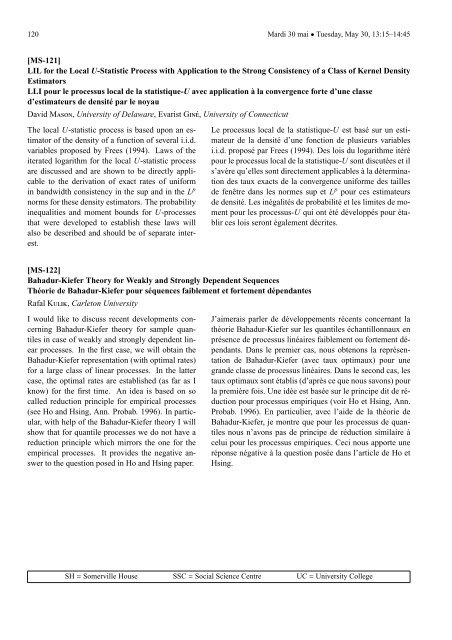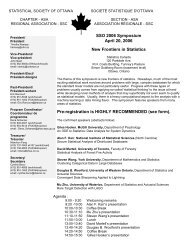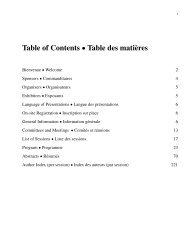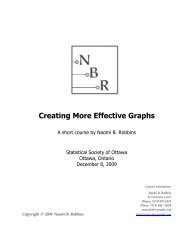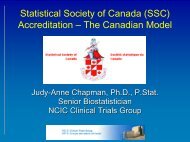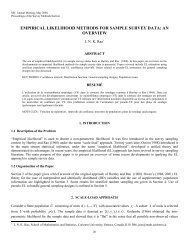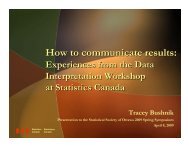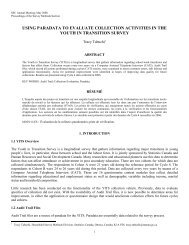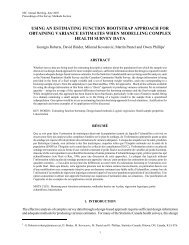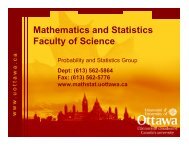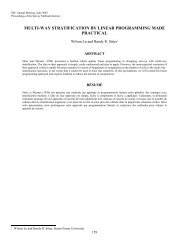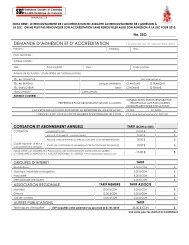Programme et résumés (pdf) - Société statistique du Canada
Programme et résumés (pdf) - Société statistique du Canada
Programme et résumés (pdf) - Société statistique du Canada
You also want an ePaper? Increase the reach of your titles
YUMPU automatically turns print PDFs into web optimized ePapers that Google loves.
120 Mardi 30 mai • Tuesday, May 30, 13:15–14:45[MS-121]LIL for the Local U-Statistic Process with Application to the Strong Consistency of a Class of Kernel DensityEstimatorsLLI pour le processus local de la <strong>statistique</strong>-U avec application à la convergence forte d’une classed’estimateurs de densité par le noyauDavid MASON, University of Delaware, Evarist GINÉ, University of ConnecticutLe processus local de la <strong>statistique</strong>-U est basé sur un estimateurde la densité d’une fonction de plusieurs variablesi.i.d. proposé par Frees (1994). Des lois <strong>du</strong> logarithme itérépour le processus local de la <strong>statistique</strong>-U sont discutées <strong>et</strong> ils’avère qu’elles sont directement applicables à la détermina-tion des taux exacts de la convergence uniforme des taillesde fenêtre dans les normes sup <strong>et</strong> L p pour ces estimateursde densité. Les inégalités de probabilité <strong>et</strong> les limites de mo-ment pour les processus-U qui ont été développés pour éta-blir ces lois seront également décrites.The local U-statistic process is based upon an estimatorof the density of a function of several i.i.d.variables proposed by Frees (1994). Laws of theiterated logarithm for the local U-statistic processare discussed and are shown to be directly applicabl<strong>et</strong>o the derivation of exact rates of uniformin bandwidth consistency in the sup and in the L pnorms for these density estimators. The probabilityinequalities and moment bounds for U-processesthat were developed to establish these laws willalso be described and should be of separate interest.[MS-122]Baha<strong>du</strong>r-Kiefer Theory for Weakly and Strongly Dependent SequencesThéorie de Baha<strong>du</strong>r-Kiefer pour séquences faiblement <strong>et</strong> fortement dépendantesRafal KULIK, Carl<strong>et</strong>on UniversityI would like to discuss recent developments concerningBaha<strong>du</strong>r-Kiefer theory for sample quantilesin case of weakly and strongly dependent linearprocesses. In the first case, we will obtain theBaha<strong>du</strong>r-Kiefer representation (with optimal rates)for a large class of linear processes. In the lattercase, the optimal rates are established (as far as Iknow) for the first time. An idea is based on socalled re<strong>du</strong>ction principle for empirical processes(see Ho and Hsing, Ann. Probab. 1996). In particular,with help of the Baha<strong>du</strong>r-Kiefer theory I willshow that for quantile processes we do not have are<strong>du</strong>ction principle which mirrors the one for theempirical processes. It provides the negative answerto the question posed in Ho and Hsing paper.J’aimerais parler de développements récents concernant lathéorie Baha<strong>du</strong>r-Kiefer sur les quantiles échantillonnaux enprésence de processus linéaires faiblement ou fortement dé-pendants. Dans le premier cas, nous obtenons la représentationde Baha<strong>du</strong>r-Kiefer (avec taux optimaux) pour unegrande classe de processus linéaires. Dans le second cas, lestaux optimaux sont établis (d’après ce que nous savons) pourla première fois. Une idée est basée sur le principe dit de ré-<strong>du</strong>ction pour processus empiriques (voir Ho <strong>et</strong> Hsing, Ann.Probab. 1996). En particulier, avec l’aide de la théorie deBaha<strong>du</strong>r-Kiefer, je montre que pour les processus de quan-tiles nous n’avons pas de principe de ré<strong>du</strong>ction similaire àcelui pour les processus empiriques. Ceci nous apporte uneréponse négative à la question posée dans l’article de Ho <strong>et</strong>Hsing.SH = Somerville House SSC = Social Science Centre UC = University College


